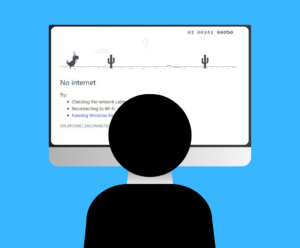
Ten years ago, the University of Mississippi ranked No. 5 among the nation’s flagship universities for internet upload speeds, according to a 2014 survey by The Huffington Post.
While UM’s current ranking is unavailable, anecdotal evidence from students and faculty points to a decline in network reliability and their ability to consistently connect.
Razavier Davis, a junior psychology major, has had Wi-Fi difficulties both in class and in his former on-campus home, Campus Walk.
“Ole Miss needs to fix the Campus Walk (Wi-Fi),” Davis said. “The router is way too far. I had to go an entire year having very bad internet, and I could barely do my homework (on) time.”
On campus, Davis noted that he experienced the most trouble in the student union, especially on the first floor.
“I was kicked out of my (online) tests because of the Wi-Fi. I almost flunked because I didn’t finish it. It’s hard to believe that they expect us to do our work when they don’t give us the Wi-Fi to do the work,” Davis said.
Some students, such as senior legal studies major Diamond Veales, have stopped using the Wi-Fi altogether.
“I have trouble loading the apps that I need for classes, like Blackboard, or just getting online in general (on the Wi-Fi),” Veales said. “It’s more convenient to use my own hotspot. … I haven’t even tried the school Wi-Fi in (two) years.”
Not all students have experienced issues.
Ella Procter, a freshman electrical engineering major, said her computer typically connects without problems; however, she also said her phone does not connect to the Wi-Fi, causing her to use her cellular data instead.
Professors are also feeling the strain of Wi-Fi problems.
Professor of Spanish and linguistics Felice Coles has experienced connectivity problems in her office in Bondurant Hall for many years.
“(My computer) will slow down and then occasionally it just won’t come on no matter what you try to connect,” Coles said.
Coles says that this forces her to resort to other teaching methods, such as downloading material and even moving to different areas such as Weir Hall. Coles says that while the Wi-Fi does not operate perfectly, she remains optimistic about how the university will handle it.
“I think IT is doing the best they can. There’s a very small team of them and a lot of things they can’t control, like the integrity of the building,” Coles said.
Lei Zhong, visiting assistant professor in the Department of Mathematics, said she has not experienced any Wi-Fi problems. Zhong teaches in the new Duff Center, and her office is located in Hume.
“I connect to the school Wi-Fi, and I don’t have any problems,” Zhong said.
The University of Mississippi’s Office of Information Technology (IT) Department and Telecommunications Services have been working to address the ongoing Wi-Fi challenges. Director of Telecommunications Michele Patton said the university had been monitoring the Wi-Fi infrastructure for issues while taking on a campus-wide update.
“Our team began planning a campus-wide Wi-Fi upgrade in the Fall of 2020. … The upgrade work began in the summer of 2022 in academic and administrative spaces,” Patton said. “Residence halls were upgraded in the summer of 2023. … With any major change in technology comes the possibility for outlying issues.”
The upgrade includes new firewall services, wired connections for wireless access points, expanded wireless service choices, upgraded server network connections from 1 GBps to 10 GBps.
Patton said the IT department noticed an increase in the number of devices on the campus networks this semester, which may be contributing to the issues. However, this was anticipated during the 2020 upgrade planning.
In response to specific problem areas, the IT department has increased the number of wireless access points in places like the student union.
“The IT department constantly evaluates the different areas on campus and looks for opportunities to improve those areas where needed,” Patton said.
The UM IT and Telecommunications departments encourage students and staff to report any Wi-Fi issues they encounter so they can be fixed quickly.
“The campus Wi-Fi infrastructure is constantly being monitored for effectiveness and reliability,” Patton said. “Of course, with the size and scale of the university, and the unpredictable nature of technology, the possibility of isolated Wi-Fi issues does exist.”



























